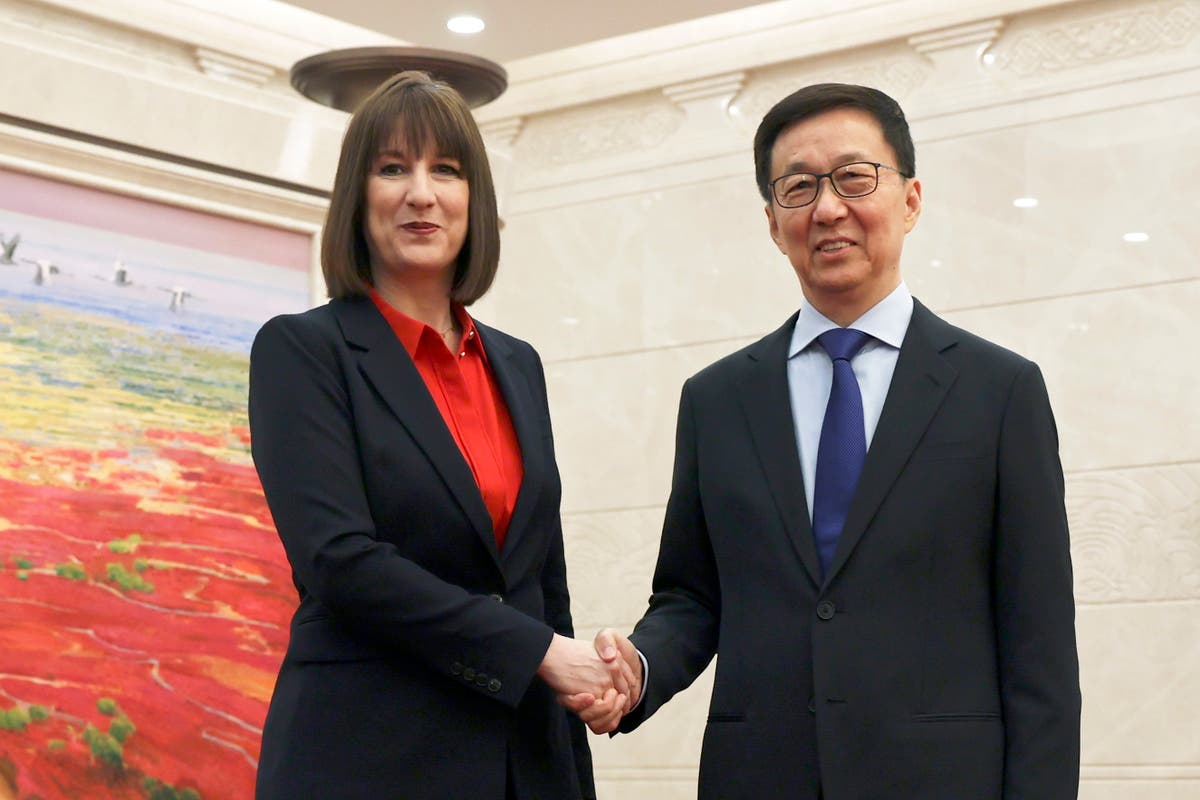Rachel Reeves has doubled down on defending her controversial trip to China as concerns grow that she will return to a full blown economic crisis next week.
Briefings have suggested that the chancellor is planning on slashing billions off disability benefits and postponing increasing defence spending to 2.5per cent of GDP until the 2030s in a bid to stay within her own borrowing limits.
Turmoil in the gilt markets has overshadowed Ms Reeves’s trip to Beijing, with the Conservatives accusing the chancellor of having “fled to China” rather than explain how she will fix the economy.
The trip is part of Labour’s push for greater engagement with Beijing, after a freezing of relations under previous Conservative prime ministers.
open image in galleryRachel Reeves met Chinese vice-premier He Lifeng on Saturday (Aaron Favila, Pool/AP) (AP)
But it also comes amid spculation that Ms Reeves is going to be forced to break her “golden rule”on borrowing limits and a report revealed by The Independent showing that a new inflation cost of living crisis could be around the corner with the price of imports on food and electrical items among other staples set to rise by up to 20 per cent.
The value of the pound also slid last week as investors held their breath on the state of the UK economy.
But defending her trip, Ms Reeves described it as a “significant milestone” in Britain’s relationship with China as she met vice-premier He Lifeng.
Speaking at the opening of the 11th UK-China Economic and Financial Dialogue, she said: “Today marks a significant milestone in the UK-China relationship, with the first economic and financial dialogue between our countries for nearly six years.
“It is a signal of this new UK Government’s commitment to fostering a stable, long-term partnership and of the importance that I place on realising the economic potential of co-operation between the UK and China.”
Noting that the global situation was “more complex and more challenging” than at the last dialogue in 2019, she added: “It is precisely in such times that practical, pragmatic co-operation between the world’s major economies is most needed.”
Significantly though Ms Reeves has been accompanied by Bank of England governor Andrew Bailey and Financial Conduct Authority chief executive Nikhil Rathi. It has been pointed out that China has bought up significant amounts of UK national debt which gives it leverage and makes it an important partner in potentially tackling a financial crisis.
open image in galleryRachel Reeves has travelled to Beijing in a bid to boost economic ties with China (Aaron Favila, Pool/AP) (AP)
In her speech the chancellor called for more trade and investment between the two countries against a “more complex and more challenging” geopolitical background.
She said: “We must seize this opportunity to set a course for a stable and mutually beneficial relationship with one another.”
Later, speaking at a meeting with Chinese vice-premier He Lifeng, she said: “I believe that increasing trade and investment with an economically important partner like China is crucial for achieving my number one mission in Government – economic growth.
“Improving market access is essential for enhancing our bilateral trade, reducing barriers to trade and creating a level playing field for businesses will benefit not only our economies but also consumers and citizens in our countries.”
Calling for an increase in investment between the UK and China, she added it was “important to prevent economic links weakening our national security and economic resilience”.
Following the meeting, the Chancellor announced that agreements had been reached worth £600 million to the UK economy over the next five years, while “re-engagement” with China “already sets us on course to deliver up to £1 billion of value for the UK economy”.
This includes agreements on financial services, agri-food and cultural exports, along with other areas.
However, there are serious concerns about the measures Ms Reeves may need to take in the short and medium term to stabilise the economic situation.
The Daily Telegraph reported that billions in benefits for people with disabilities could be slashed in a move which could spark a rebellion among Labour MPs. They are already unhappy about winter fuel payments being withdrawn from 10 million pensioners and a refusal end the two child benefit cap.
The cost of disability benefits is forecast to rise from £22 billion to £35 billion by 2029, a 60 per cent increase which is seen as unsustainable.
And Ms Reeves is understood to have told Treasury officials that “tough” decisions ned to be made to keep the bill down with her vision of Labour being “the party of work”.
Meanwhile, her restraints could put the UK on another collision course with the Trump administration with the push to increase defence spending to 2.5 per cent of GDP shelved until the 2030s. The president-elect has called on Nato allies to increase spending to 5 per cent of GDP but Labour is set to struggle to achieve even half that amount during his term in office.
Paul Johnson, outoging director of the Institute for Fiscal Studies (IFS), warned that in financial terms it would be “staggeringly hard” to achieve the 2.5 per cent target in the next five years.
Mr Johnson also described Ms Reeves breaking her borrowing limits as “pretty scary for the markets” which were already “concerned about the UK position”.
